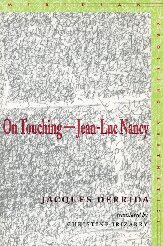

Most ebook files are in PDF format, so you can easily read them using various software such as Foxit Reader or directly on the Google Chrome browser.
Some ebook files are released by publishers in other formats such as .awz, .mobi, .epub, .fb2, etc. You may need to install specific software to read these formats on mobile/PC, such as Calibre.
Please read the tutorial at this link. https://ebooknice.com/page/post?id=faq
We offer FREE conversion to the popular formats you request; however, this may take some time. Therefore, right after payment, please email us, and we will try to provide the service as quickly as possible.
For some exceptional file formats or broken links (if any), please refrain from opening any disputes. Instead, email us first, and we will try to assist within a maximum of 6 hours.
EbookNice Team

Status:
Available4.4
12 reviewsUsing the philosophy of Jean-Luc Nancy as an anchoring point, Jacques Derrida in this book conducts a profound review of the philosophy of the sense of touch, from Plato and Aristotle to Jean-Luc Nancy, whose ground-breaking book Corpus he discusses in detail. Emmanuel Levinas, Maurice Merleau-Ponty, Edmund Husserl, Didier Franck, Martin Heidegger, Francoise Dastur, and Jean-Louis Chrétien are discussed, as are René Descartes, Diderot, Maine de Biran, Félix Ravaisson, Immanuel Kant, Sigmund Freud, and others. The scope of Derrida's deliberations makes this book a virtual encyclopedia of the philosophy of touch (and the body).
Derrida gives special consideration to the thinking of touch in Christianity and, in discussing Jean-Luc Nancy's essay "Deconstruction of Christianity," devotes a section of the book to the sense of touch in the Gospels. Another section concentrates on "the flesh," as treated by Merleau-Ponty and others in his wake. Derrida's critique of intuitionism, notably in the phenomenological tradition, is one of the guiding threads of the book.
On Touching includes a wealth of notes that provide an extremely useful bibliographical resource. Personal and detached all at once, this book, one of the first published in English translation after Jacques Derrida's death, serves as a useful and poignant retrospective on the work of the philosopher. A tribute by Jean-Luc Nancy, written a day after Jacques Derrida's death, is an added feature.